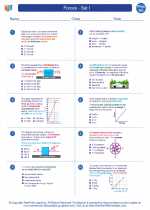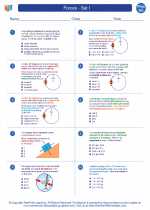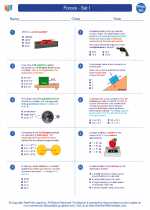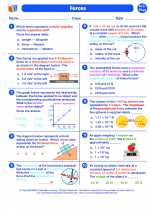Field Surveys
A field survey is a method of collecting information or data about a particular area of interest by physically visiting and observing the location. In the context of Physics, field surveys can be used to measure and analyze various physical quantities and phenomena in the natural environment.
Types of Field Surveys
There are several types of field surveys commonly used in Physics:
- Geological Surveys: These surveys involve studying the structure and composition of the Earth's crust, as well as the distribution of geological features such as rocks, minerals, and fossils.
- Environmental Surveys: Environmental surveys focus on assessing the impact of human activities on the natural environment, including measurements of air and water quality, soil properties, and biodiversity.
- Topographic Surveys: These surveys are used to map and measure the physical features of a landscape, including elevation, slope, and the distribution of natural and man-made features.
- Meteorological Surveys: Meteorological surveys involve collecting data on weather and climate conditions, such as temperature, humidity, wind speed, and precipitation.
Tools and Techniques
Field surveys in Physics often require the use of specialized tools and techniques for data collection. Some common tools and techniques include:
- GPS Receivers: Global Positioning System (GPS) receivers are used to accurately determine the geographic coordinates of survey locations.
- Geophysical Instruments: These instruments, such as seismographs and magnetometers, are used to measure various physical properties of the Earth's subsurface, such as seismic waves and magnetic fields.
- Remote Sensing: Remote sensing techniques, including satellite imagery and aerial photography, are used to gather information about large-scale environmental and geological features.
- Weather Stations: These stations are equipped with sensors to measure atmospheric conditions, including temperature, pressure, and precipitation.
Field Survey Process
Conducting a field survey typically involves the following steps:
- Planning: Define the objectives of the survey, select the appropriate tools and techniques, and plan the survey route or sampling locations.
- Data Collection: Visit the survey locations and use the chosen tools and techniques to collect relevant data and measurements.
- Data Analysis: Process and analyze the collected data to draw conclusions and make interpretations about the surveyed area.
- Reporting: Present the findings of the survey in a comprehensive report, including maps, graphs, and other visual aids as necessary.
Key Concepts in Field Surveys
When studying field surveys in Physics, it's important to understand the following key concepts:
- Accuracy and Precision: The accuracy of the measurements and the precision of the instruments used are crucial for obtaining reliable data during a field survey.
- Data Interpretation: Proper interpretation of the collected data requires an understanding of the physical principles and phenomena being measured, as well as knowledge of relevant theories and models.
- Environmental Impact: Field surveys often involve assessing the impact of human activities on the natural environment, making it important to consider ethical and environmental implications.
Practice Questions
Test your understanding of field surveys with the following practice questions:
- What are the main types of field surveys used in Physics, and what are their primary objectives?
- Describe the role of GPS receivers in conducting a field survey. How do they contribute to the accuracy of data collection?
- Explain the importance of data interpretation in the context of field surveys. Provide an example of how data interpretation can lead to meaningful conclusions.
- Discuss the ethical considerations that should be taken into account when conducting environmental surveys.
Remember to review the concepts and principles related to field surveys in Physics to prepare for further discussions and assessments.
.◂Physics Worksheets and Study Guides High School. Forces - Set I

 Worksheet/Answer key
Worksheet/Answer key
 Worksheet/Answer key
Worksheet/Answer key
 Worksheet/Answer key
Worksheet/Answer key
